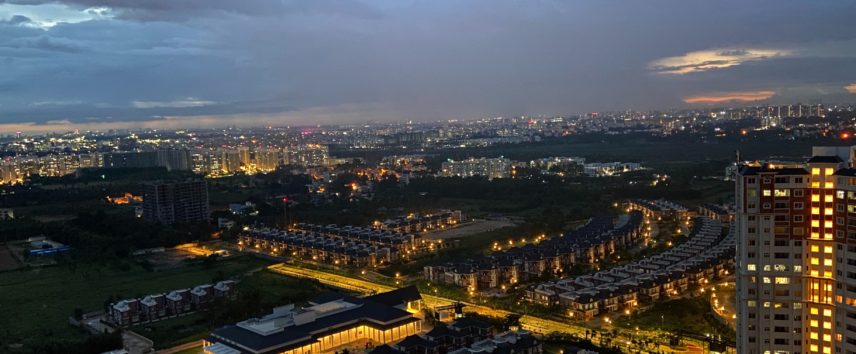Trending Now
- “I will soon make an announcement regarding a statewide tour across Tamil Nadu.” – O. Panneerselvam.
- Vatsala, Asia’s oldest elephant, has passed away at Panna Tiger Reserve; social activists mourn the death of this elephant, which lived for over 100 years.
- “The U.S. Govt earned ₹8 lakh crore this year through increased tariffs on foreign goods.” – U.S President Donald Trump.
- World No.1 Aryna Sabalenka has advanced to the semifinals in the Women’s Singles category at Wimbledon Tennis.
Columns
India’s Imperative: Bolstering Manufacturing and Diverse Sectors to Retain Graduates in Specialized Fields
![]() October 18, 2023
October 18, 2023
A noticeable trend in recent times is the increasing inclination of recent graduates towards IT careers. This article seeks to delve into the significant impact of this shift on educators who might believe that certain students should explore alternative fields.
Featured in this article is Mr. K. Anand, who boasts a distinguished career spanning over three decades, marked by remarkable technical prowess, innovation, and mentoring. With an impressive portfolio of 55 patents and substantial contributions to product development, Anand played a pivotal role in leading materials innovation projects across diverse sectors such as aviation, energy, and healthcare during his tenure at GE, both in the US and Bangalore. Notably, he contributed to the transformation of GE Bangalore into a thriving center for creative thinking. Even after retiring, Anand remains committed to fostering innovation as a key figure in the Deakin-IIT Centre of Excellence, with a focus on advanced materials, healthcare, and sustainable energy. He continues to share his wealth of expertise through consultancy engagements, benefiting both academia and various organizations.
To kick off the discussion, Mr. Anand, could you provide insight into the broader implications of the increasing number of graduates pursuing IT careers, particularly in terms of their impact on educators?
I don’t intend to offer strong personal opinions but rather focus on the facts. IT remains the preferred career path for the majority of engineering graduates, transcending disciplinary boundaries. This phenomenon is particularly evident in tier one and tier two institutes, where various organizations, including those in IT, finance, analytics, actively recruit fresh talent. Consequently, these graduates often deviate from traditional engineering career paths in ways that may not align with our conventional expectations.
Numerous factors contribute to this trend. Notably, IT positions tend to offer higher salaries, and the cost of living in major cities can be prohibitively high. Even in tier one cities like Pune, Coimbatore, and Baroda, living costs can be substantial. Graduates are inclined toward career paths that promise better financial rewards. However, this comes at a cost to the nation, and it’s crucial to consider this from multiple angles.
This situation leads many to gravitate towards careers that offer better financial incentives, but it also poses consequences for the country. We need to view this issue from the perspective of young people, the economy, and the overall capabilities of the nation. Let’s explore this from these two angles.
I’ll start by examining the state of the Indian manufacturing and product development sectors. With the exception of top engineering organizations involved in manufacturing, sectors like automobiles, energy, petrochemicals, and their tier one suppliers maintain strong capabilities. In most other areas, innovation at the grassroots level is limited. While innovation remains robust at the top levels, with capable individuals driving change within organizations, India lags behind other countries in manufacturing, which has economic repercussions.
To put things into perspective, our ability to innovate at the top level remains strong. Capable individuals continue to rise to leadership positions and drive change. India is undoubtedly a global IT superpower, but in the realm of manufacturing, we are lagging behind countries like China and Vietnam.
In particular, China has a lead over India in manufacturing and the availability of certain materials. We are often forced to import certain grades in the automotive sector, which creates economic challenges. In terms of electronics, India lags behind in chip fabrication and other capabilities compared to several other Asian countries.
For instance, the Netherlands has established itself as a hub for semiconductor design, while the United States possesses undeniable superior capacity in various areas. India lags behind in many aspects, and this affects the country’s ability to generate certain types of jobs.
To achieve robust economic growth, we need to examine the numbers. India’s population is comparable to China’s, yet our car market is just a quarter of China’s size. Our per capita GDP is one-fifth of China’s, and this is where the impact is most strongly felt. Without a strong manufacturing or engineering sector, our economy doesn’t fully leverage our workforce’s capabilities. While IT has offered a straightforward solution, our focus should be on complete self-reliance in a broader spectrum of domains.
From the perspective of a student and professional, I’d like to emphasize the significance of the mind-body connection when working on engineering projects. Being hands-on with engineering materials, metals, and seeing the physical results of your design, such as bridges being built, provides a unique sense of satisfaction and accomplishment. This mind-body connection is essential for product development and invention, which keeps many of us engaged.
In my career before retiring, I was willing to commute long hours and work extensively because I found the work engaging and satisfying. I didn’t mind late-night or early-morning calls; the work was compelling. This zeal instilled by the engineering industry is what drives many professionals.
So, when I speak to these young graduates, I want to ask them directly: Is the primary goal merely to earn a substantial paycheck? Earning money can be achieved through various means, like investing in the stock market or mutual funds. However, having a fulfilling career comes from a deeper connection where your mind and body are engaged in something you develop.
IT careers can certainly provide this satisfaction, but not everyone can engage in this way, as it can’t be a mass-market endeavor with millions of people writing code. True value often comes from the tangible, real-world experiences.
You have a multidisciplinary background. Did you ever consider pursuing an IT job, especially when many of your friends did? What factors guided your choice of the field you are in today?
In my earlier days, IT was generally open to those with backgrounds in electrical and electronics, and metallurgists like me were not typically considered for IT roles. I initially considered jobs in sales and marketing. However, during my BE project, I found myself in a creative, uncharted territory with experiments and data analysis. My thesis advisor’s support and encouragement fueled my interest.
As a result, I took up a sales position. Later, I appeared for the MTech exam, essentially on a whim, and received admission to IIT Madras, which I chose over my job. I didn’t want any payment for the work I had done. This decision eventually led to a series of events that culminated in my enrollment at IIT Madras.
To summarize, I was fortunate that IT firms were not aggressively recruiting me with significantly higher pay offers compared to Tata Steel, which was readily available. The situation for students today might be different, as they are bombarded with tempting prospects of working in air-conditioned offices, owning cars and houses. That’s the allure that IT offers.
For graduates who pursued education in institutes like IITs, IISc, and NITs, it’s essential to make informed career choices, not solely driven by financial considerations. What has been your observation?
When making statements, we must ensure statistical accuracy. Many IT students choose integrated master’s degrees, which are five-year programs. A significant percentage of students opt for this path, and the numbers should be validated.
In the IIT-IISc system, students aiming for PhDs or master’s degrees are of exceptional quality. There has been a shift from the past when only those unable to secure admissions or aid pursued PhDs in Indian universities. Today, gaining admission to IISc or IIT is highly competitive, with students requiring top GATE scores. The demand for these programs is considerable.
Those pursuing PhDs at these institutions are exceptional in terms of both capability and technical fearlessness. Technical bravery is crucial, and these students are equipped with it, knowing they can excel in an environment that not many can navigate. In fact, it’s often easier to pursue a PhD abroad than to secure admission to IISc or IIT.






















